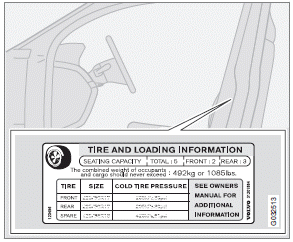Inflation placard


Tire inflation placard
Check tire inflation pressure regularly.
A table listing the recommended inflation pressure for your vehicle. A tire inflation pressure placard is also located on the driver's side B-pillar (the structural member at the side of the vehicle, at the rear of the driver's door opening). This placard indicates the designation of the factory-mounted tires on your vehicle, as well as load limits and inflation pressure.
NOTE
The placards shown indicate inflation pressure
for the tires installed on the vehicle at
the factory only.
Х Use a tire gauge to check the tire inflation
pressure, including the spare, at least once
a month and before long trips. You are
strongly urged to buy a reliable tire pressure
gauge, as automatic service station
gauges may be inaccurate.
Х Use the recommended cold inflation pressure
for optimum tire performance and
wear.
Х Under-inflation or over-inflation may cause
uneven treadwear patterns.
WARNING
Х Under-inflation is the most common
cause of tire failure and may result in
severe tire cracking, tread separation,
or "blow-out," with unexpected loss of
vehicle control and increased risk of
injury.
Х Under-inflated tires reduce the load carrying
capacity of your vehicle.
When weather temperature changes occur, tire inflation pressures also change. A 10-degree temperature drop causes a corresponding drop of 1 psi (7 kPa) in inflation pressure. Check your tire pressures frequently and adjust them to the proper pressure, which can be found on the vehicle's tire information placard or certification label.
See also:
Incoming calls
Press OK/MENU (or the thumb wheel on
the steering wheel keypad) to answer a
call, even if the infotainment system is currently
in another mode (e.g., RADIO or
MEDIA).
Press EXIT to reject a c ...
Sensor location
Х The sunlight sensor is located on the top
side of the dashboard.
NOTE
The sunlight sensor monitors which side of
the car that is most exposed to sunlight.
This can mean that the temperature m ...
Searching for contacts
Searching for contacts using the text wheel
List of characters
Switch between character entry modes (see the following table)
Phone book (list of contacts)
To search for or edit a contact ...
